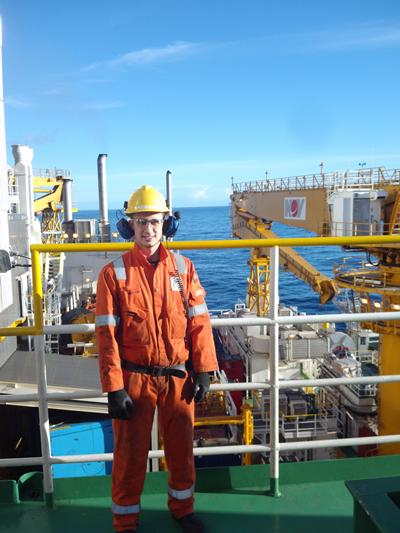Matthew Leng MEng Mechanical Engineering/Advanced Materials, 2016
Offshore Drilling Engineer, BP

The course has helped me in so many ways get to where I am. The range of modules I took at university gave me a broad understanding of different areas of engineering, and this helps me on the rig where there are all kinds of different engineering principles that I need to understand.
Can you provide a brief summary of your time at Southampton?
I spent four years at the University of Southampton and relished every aspect of my life there. I made some fantastic friends, from both my halls and my course, and that helped me to have an incredible experience. I enjoyed being challenged to push myself to become a better engineer, whilst also enjoying the social side of the University as well - playing intramural football and attending socials every week.
What did you enjoy most about your course?
The most enjoyable aspect for me was the project work. Having both the individual project in third year and group project in fourth year allowed me to really get immersed in the subjects and gave me the opportunity to use the lab facilities on offer. Producing the final piece of work for each project was a very proud moment because of all the hard work I had dedicated.
What were your supervisors like? Did you find them supportive?
All the supervisors I had were extremely knowledgeable and made the course both interesting and challenging. They were approachable and always able to help if I didn’t understand something. My project supervisor set up weekly meetings that gave me the opportunity to go over anything I needed help with and make sure I took the project in the right direction.
How did the facilities available at the University help you with your research and project work?
The facilities at the University gave me the opportunity me to carry out a very interesting third year project, where I looked at the capability of self-healing materials. The facilities on offer meant I was also able to manufacture my own composite materials on site which I used as a comparative material and also allowed me to do a full array of testing.
What is your current role?
I work for BP on an offshore drilling rig in the North Sea, on a two-on-two-off rotation. Being part of an operating company, I help in managing our operations and monitoring of the drilling to make sure we deliver successful wells. This involves writing work instructions, calculating the volumes of cement we need, analysing the pressure tests, writing the daily reports to the onshore team, and looking for ways we can optimise our operations.
In what ways does the course you took at Southampton help you within your career?
I think the course has helped me in so many ways get to where I am. The range of modules I took at university gave me a broad understanding of different areas of engineering, and this helps me on the rig where there are all kinds of different engineering principles that I need to understand. The project work was a huge help too, because having both an individual project and group project taught me how to approach a work scope, manage my time and also get the best out of a team. These are all critical aspects of my role and I don’t think I would have got the job if I didn’t have the evidence of these through my university projects.
What has been your greatest career achievement so far?
I think my whole role in general feels like a massive achievement. Getting a helicopter to work and being in the middle of the sea for two weeks at a time isn’t your usual office job!
What advice would you offer to potential students?
I would tell the students not to worry if they don’t know what they want to do after finishing their degree. I went to university with no real idea of where to go next, but completing a great range of modules in first year allowed me to see what interested me the most so I could tailor my degree to follow that path. I would also highly recommend getting summer internships if you can; I did two internships at two different companies, gaining six months of experience without taking a year out of university. This helped me get my job I have today and gave me an insight into the industry in which I now work.